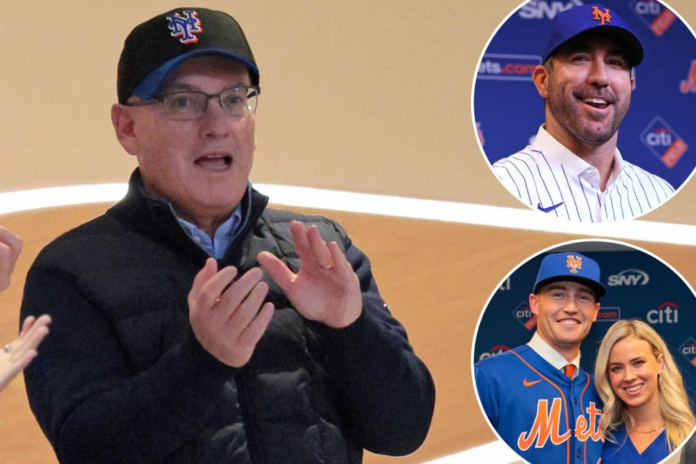Steve Cohen has been an MLB disruptor, spending money left and right on players since buying the Mets for $2.4 billion in 2020. He has rankled other owners for his willingness to dole out dollars at a rate that will lead to an unprecedented payroll this year.
Cohen doesn’t seem to care about his contemporaries’ displeasure. He has instead challenged them to meet the demands of their fans.
“I’ve heard what everyone else has heard: that they’re not happy with me,” Cohen said in an interview with ESPN. “I hear things from people who are maybe more neutral -— that they’re taking a lot of heat from their fans. I kind of look at that like, you’re looking at the wrong person. They’re putting it on me. Maybe they need to look more at themselves.
“I’m not responsible for how other teams run their clubs. I’m really not. That’s not my job. And there are disparities in baseball. We know that to be true. I’m following the rules. They set the rules down, I’m following them.”
Mets owner Steve Cohen during Game 3 of the wild-card playoff round against the Padres on Oct. 9, 2022. Charles Wenzelberg/NY Post
The Mets are currently projected to have a record $369.9 million payroll, according to Baseball Prospectus’ Cot’s Contracts. And with the Mets set to pay $98.6 million in luxury taxes, per ESPN, Cohen’s total tab for the 2023 season is about $468.5 million.
This offseason alone, the Mets in free agency have given Brandon Nimmo an eight-year, $162 million contract; Edwin Diaz a five-year, $102 million contract; Justin Verlander a two-year, $86.6 million contract; Kodai Senga a five-year, $75 million contract; Jose Quintana a two-year, $26 million contract; Omar Narvaez a two-year, $15 million contract; Adam Ottavino a two-year, $14.5 million contract and David Robertson a one-year, $10 million contract. They also gave Jeff McNeil a four-year, $50 million extension on Jan. 27.
Cohen was also willing to give Carlos Correa a 12-year, $315 million contract, but concern about Correa’s surgically repaired ankle led to the agreement falling apart.
Justin Verlander during a press conference after the Mets signed him in free agency on Dec. 20, 2022. Charles Wenzelberg/NY Post
Brandon Nimmo and his wife Chelsea after the Mets re-signed Nimmo on Dec. 15, 2022. Charles Wenzelberg/NY Post
Before the 2021 season began, the Mets gave Francisco Lindor a 10-year, $341 million extension, and they also gave big money to Max Scherzer (two years, $86.6 million) and Starling Marte (four years, $78 million).
“I didn’t know I was going to have to spend like I did,” Cohen told ESPN. “I actually was a little naive in that regard. But once I got comfortable and realized, OK, what’s it going to take to put a great team on the field, I still had made a commitment to the fans, and to baseball, that I was going to come in and turn this thing around. I came in saying I’m all-in. And I keep my word.”
Cohen said he doesn’t see the “Cohen Tax” — the fourth tax threshold of $293 million — as a “big deal” because he was already going to be spending a lot.
“So it’s like the government raising taxes. You’re already in a high bracket,” Cohen said in the interview. “What I think about is making income. If I make income, it solves problems. It’d be great to get the payroll to the point where I don’t have to pay tax anymore. That’s the goal. If we do our job and develop a farm system and get a nice, sustainable pipeline going, we should be able to accomplish that.”


